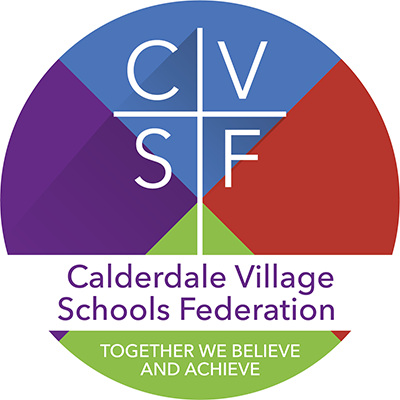
Developing literate citizens of the future.
English enables pupils to develop a love of literature which is shared and encouraged. Children will develop and understanding of how our language works and be able to speak and write fluently so that they can communicate their ideas and emotions to others and through their reading and listening, others can communicate with them, whilst engaging with quality texts. Through reading in particular, pupils have a chance to develop culturally, emotionally, intellectually, socially and spiritually. Reading will enable pupils both to acquire knowledge and to build on what they already know, enabling them to participate fully as a member of society. Writing allows pupils to express themselves creatively and with clarity, refining their ability to organise ideas, adapt their style for different purposes and audiences, and develop their own voice as authors.
In Writing, Calderdale Village Schools Federation aim to develop confident and successful writers across a wide range of genres. We aspire for all children to achieve consistent transcriptional and compositional skills that can be carried with them through their academic lives and into their future. Our two-year cycle is designed to be relevant, progressive, and linked with other areas of the curriculum so cross-curricular writing is second nature. Each unit is powered by high-quality, age-appropriate texts to immerse our children in a love of literature to unlock the power of language, spoken and written.
As stated in the National Curriculum 2014, our teaching sequence of writing follows the immerse, analyse, plan, draft, edit and evaluation of writing. As a Federation, we have tailored our teaching of writing to first immerse our children, throughout all year groups, in high-quality, age-appropriate texts aimed to foster and encourage the curiosity of writing through reading. From this, our endeavour is to explore a wide variety of linked writing – including teacher modelled - to submerge our children in rich vocabulary, good use of grammatical features and key examples of high-quality writing to pull out genre-specific features. In addition to planning our high-quality linked texts, we also strategically plan our teaching of grammar, for each year group, to match the genre of writing being taught; our intention is to encourage the best possible outcome for each and every piece of writing for each and every child.
We do this through Ready Steady Write which is an award-winning, evidence-based primary writing scheme for EYFS, KS1 and KS2. Built around high-quality, language-rich literature, it provides a structured and sequenced approach that develops confident, independent writers across all year groups. These writing units are carefully mapped to the National Curriculum to ensure consistent progression from early years through to Year 6 and are supplemented to ensure a wide and rice exposure to genres and diverse texts.
Following on with our tailored approach, Calderdale Village Schools Federation have adopted whole class feedback for marking writing. Whole class feedback is when a teacher delivers comments about performance to the entire class as a whole, rather than individually. This enables teachers to identify common errors in work and address them en masse: an efficient way to use time in the classroom without having to spot, and comment on, the same mistakes time and time again. Additionally, the whole class feedback opens a dialogue between teacher and child/children enabling the children to feel more involved in the feedback process: the more involved that students feel in their assessment and evaluation, the better that they can understand and how they need to improve, and the quicker they can make these changes.
Spelling
Across the Federation, we use EdShed as our carefully planned spelling scheme, designed to ensure clear progression as children move through year groups. The scheme focuses on teaching spelling rules and patterns in a structured way, helping pupils to understand how words are built and why they are spelled as they are. Through interactive games and activities, children can practise their spellings in an engaging and enjoyable way, both in class and at home. This approach not only makes spelling practice fun but also supports long-term retention and builds confidence in applying spelling skills across all areas of writing.
Handwriting – Letter-join
Calderdale Village Schools Federation are very proud of our pupil’s handwriting and take particular care in our cursive handwriting style. We use Letter-join’s on-line handwriting resource as the basis of our handwriting policy as it covers all the requirements of the National Curriculum.
Handwriting is a basic skill that influences the quality of work throughout the curriculum. By the end of Key Stage 2 all pupils should have the ability to produce fluent, legible and, eventually, speedy joined-up handwriting, and to understand the different forms of handwriting used for different purposes. Our intention is to make handwriting an automatic process that does not interfere with creative and mental thinking.
Aims:
- To develop a neat, legible, speedy handwriting style using continuous cursive letters, which leads to producing letters and words automatically in independent writing.
- To establish and maintain high expectations for the presentation of written work.
- For pupils to understand, by the end of Year 6, the importance of neat presentation and the need for different letterforms (cursive, printed or capital letters) to help communicate meaning clearly.
Handwriting is a cross-curricular task and will be taken into consideration during all lessons. Formal teaching of handwriting will be carried out regularly and systematically to ensure Key Stage targets are met.












